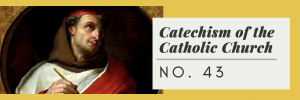
July 15 2020
Memorial of Saint Bonaventure, Bishop and Doctor of the Church
Reading 1 IS 10:5-7, 13-16
Thus says the LORD:
Woe to Assyria! My rod in anger,
my staff in wrath.
Against an impious nation I send him,
and against a people under my wrath I order him
To seize plunder, carry off loot,
and tread them down like the mud of the streets.
But this is not what he intends,
nor does he have this in mind;
Rather, it is in his heart to destroy,
to make an end of nations not a few.
For he says:
“By my own power I have done it,
and by my wisdom, for I am shrewd.
I have moved the boundaries of peoples,
their treasures I have pillaged,
and, like a giant, I have put down the enthroned.
My hand has seized like a nest
the riches of nations;
As one takes eggs left alone,
so I took in all the earth;
No one fluttered a wing,
or opened a mouth, or chirped!”
Will the axe boast against him who hews with it?
Will the saw exalt itself above him who wields it?
As if a rod could sway him who lifts it,
or a staff him who is not wood!
Therefore the Lord, the LORD of hosts,
will send among his fat ones leanness,
And instead of his glory there will be kindling
like the kindling of fire.
Responsorial Psalm 94:5-6, 7-8, 9-10, 14-15
R. (14a) The Lord will not abandon his people.
Your people, O LORD, they trample down,
your inheritance they afflict.
Widow and stranger they slay,
the fatherless they murder.
R. The Lord will not abandon his people.
And they say, “The LORD sees not;
the God of Jacob perceives not.”
Understand, you senseless ones among the people;
and, you fools, when will you be wise?
R. The Lord will not abandon his people.
Shall he who shaped the ear not hear?
or he who formed the eye not see?
Shall he who instructs nations not chastise,
he who teaches men knowledge?
R. The Lord will not abandon his people.
For the LORD will not cast off his people,
nor abandon his inheritance;
But judgment shall again be with justice,
and all the upright of heart shall follow it.
R. The Lord will not abandon his people.
Alleluia MT 11:25
R. Alleluia, alleluia.
Blessed are you, Father, Lord of heaven and earth,
you have revealed to little ones the mysteries of the Kingdom.
R. Alleluia, alleluia.
Gospel MT 11:25-27
At that time Jesus exclaimed:
“I give praise to you, Father, Lord of heaven and earth,
for although you have hidden these things
from the wise and the learned
you have revealed them to the childlike.
Yes, Father, such has been your gracious will.
All things have been handed over to me by my Father.
No one knows the Son except the Father,
and no one knows the Father except the Son
and anyone to whom the Son wishes to reveal him.”

Catechism of the Catholic Church
43 Admittedly, in speaking about God like this, our language is using human modes of expression; nevertheless it really does attain to God himself, though unable to express him in his infinite simplicity. Likewise, we must recall that “between Creator and creature no similitude can be expressed without implying an even greater dissimilitude”;17 and that “concerning God, we cannot grasp what he is, but only what he is not, and how other beings stand in relation to him.”
 “For greater things you were born.” (Ven. Mother Luisita)
“For greater things you were born.” (Ven. Mother Luisita)
WEDNESDAY, JULY 15TH Mt. 11:25-27 “I give praise to you, Father, Lord of heaven and earth, for although you have hidden these things from the wise and the learned you have revealed them to the childlike.”
- Jesus words today immediately follow His words in yesterday’s Gospel, where He condemned those who are hard of heart! The opposite of the hard hearted are the childlike – those who love God without reserve and place all their trust in Him, the only One worthy of our total trust and love!
- It is not reasonable to place all our trust in human beings; it’s not even fair to do so! It places a burden on them they cannot possibly carry, expectations they cannot possibly fulfill! It is asking them to fill the shoes of God Himself! Something none of us can do!
- However, most of us are more hard hearted than childlike – more proud than humble. We need to see ourselves in the light of Truth and so think less of ourselves, to have any idea of the greatness of the Father’s love for us!
We offer three meditations to help us turn our heart to the Father with filial and childlike trust.
- From Humility to Mercy. We have to be humble. We have to know ourselves. The knowledge of self that St. Therese had: “I am nothing, I can do nothing; all is God’s grace.” And, “I was capable of committing the most heinous sins had not God cleared the path before me.”
- Practical steps to practice humility. How to live humbly.
- Throw yourself without fear into the arms of the Father. “He will embrace you, He will heal and save you!”
From Humility to Mercy… by St. Bernard of Clairvaux (+1153)
When in the light of Truth men know themselves and so think less of themselves, it will certainly follow that what they loved before will now become bitter to them. They are brought face to face with themselves and blush at what they see.
Their present state is no pleasure to them. They aspire to something better and at the same time realize how little they can rely on themselves to achieve it! It hurts them and they find some relief in judging themselves severely. Love of truth makes them hunger and thirst after justice, and conceive a deep contempt for themselves.
They are anxious to exact from themselves full satisfaction and real amendment. They admit that to make satisfaction is beyond their own powers – when they have done all that is commanded them they acknowledge that they are still unprofitable servants.
They fly from justice to mercy, by the road Truth shows them: Blessed are the merciful, for they shall obtain mercy. They look beyond their own needs to the needs of their neighbors and from the things they themselves have suffered they learn compassion.
Practical steps to grow in humility… by St. Mother Teresa of Calcutta (+1997)
These are a few ways we can practice humility:
- To speak as little as possible of one’s self.
- To mind one’s own business.
- Not to want to manage other people’s affairs.
- To avoid curiosity.
- To accept contradictions and correction cheerfully.
- To pass over the mistakes of others.
- To accept insults and injuries.
- To accept being slighted, forgotten and disliked.
- To be kind and gentle even under provocation.
- Never to stand on one’s dignity.
- To choose always the hardest.
Throw yourself without fear into the arms of the Father… by Saint Albert the Great (+1280)
Abide in the Father in the secret place of your soul as tranquilly as though there had already risen upon you the dawn of Eternity, the unending Day of God.
Strong in the love of Jesus, go forth from yourself, with a heart pure, a conscience at peace, a faith unfeigned; and in every trial, every event, commit yourself unreservedly to the Father, having nothing so much at heart as perfect obedience to His will and good pleasure.
Let us not forget this truth: the moment a man, by the help of the Father, succeeds in overcoming his own will, that is, in freeing himself from every inordinate affection and care, to cast himself and all his miseries unreservedly into the bosom of the Father, that moment he becomes so pleasing to the Father that he receives an outpouring of grace.
This grace brings love of the Father, and this love drives out all fear and hesitation, and fills the soul with confidence and hope. What is more blessed than to cast all our care on Him who cannot fail? As long as you lean upon yourself you will totter. Throw yourself without fear into the arms of the Father. He will embrace you, He will heal and save you.
If you think often of these truths they would bring you more happiness than all the riches, delights, honors of this false world, and would make you more blessed than all the wisdom and knowledge of this corruptible life.